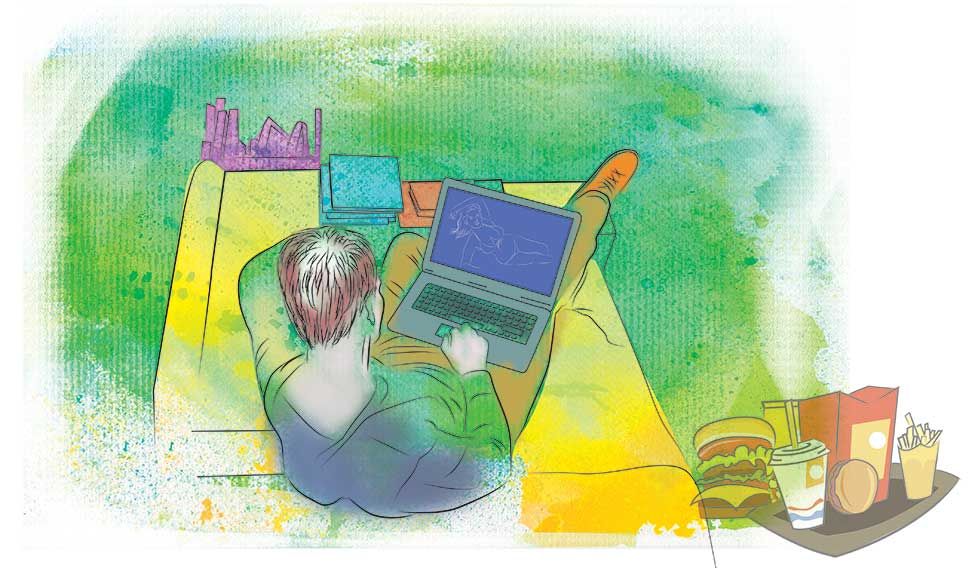Eight hundred and fifty-seven porn sites are blocked in India. Yet, the diligent browser needs to only put in some minutes of extra effort, and after hitting the firewall a few times, can still access pornography on the internet. In the government's action taken report somewhere, a notation, however, must have been put down saying online pornography has been successfully blocked.
But why were only these 857 sites targeted, when the government (both the UPA and the NDA, perhaps one instance when both thought alike) had cried itself hoarse at every hearing of the public interest litigation seeking ban on online porn, saying that there were over 40 million sites, and that clamping down on one would only result in another set popping up in no time? The answer is simple: it was a tentative list prepared by the Indore-based litigant Kamlesh Vaswani and his advocate Vijay Panjwani.
The manner in which the entire drama is unfolding is nothing short of a comedy of errors, says cyber lawyer Pawan Duggal. Vaswani, an advocate with a modest practice in Indore, decided that something had to be done to tackle crimes against women, and he zeroed in on internet porn as the villain, which drove men to rape women. So he filed a PIL, his first ever, in 2013. Thus began a fraught case with no solution in sight. While the court demanded to know what the government was doing in this matter, the government kept pleading that the issue was beyond its scope, internet being a hydra-like creature and difficult to curb.
Indeed, as arguments proceeded, Chief Justice H.L. Dattu himself said that adults had a right to watch pornography in privacy. “My plea was that access to pornography should be made difficult, but that the government was not doing anything about it,” says Panjwani. “The department of telecommunications said it couldn't identify any offensive sites, so we furnished this list as an illustration. It was by no means exhaustive. That is when the judge asked the government counsel, Pinky Anand, why they hadn't acted upon the list.”
On July 31, the government issued an order under Section 79 (3)(b) of the Information Technology Act, directing internet service providers (ISPs) to disable access to 857 sites. Information Technology secretary R.S. Sharma said they were following court directives. “The notification was defective,” says Duggal. “It relied on grounds of decency and morality, which are not covered under Section 79.” Without crosschecking the list, the government banned humour and even dating sites that the enthusiastic litigant had added to the list.
Worse, when this move became a matter of public derision and ridicule, Communications and Information Technology Minister Ravi Shankar Prasad held a high level meeting on August 4 and announced partial withdrawal of the ban. Now, they were only asking ISPs to clamp down on sites that were showing child pornography. He emphasised the government's commitment to freedom and rejected any allegation of Talibanisation.
Only, the second move brought in further ridicule. How were ISPs to decide whether the people in the film were adults or minors? There is a thin line which divides teenagers on either side of 18, and merely by looking at a person, one cannot determine the legal age.
As the government passed the buck to ISPs, it didn't pause to consider that it was outsourcing the responsibility of exercising discretion to service providers, which the law doesn't mandate, say observers. “This can be a dangerous trend, even the Supreme Court has in the past said the government should be the discretionary authority,” says Duggal. “Where are the checks and balances otherwise? Also, for starters, were guidelines on identifying child porn given to the ISPs?”
The ISPs wrote back to the government explaining their inability to identify child pornography and saying it was unfair to burden them with this responsibility. And, while the government takes its time responding, ISPs took a bold decision. They would block all 857 sites till further orders.
So has anything been achieved? “Not much really, this ban will remain on paper,” says Panjwani. “You think blocking a specific site will be a success story? So many others will crop up. If the government had the will, it could have worked out a solution. We have experts as witnesses who say technology to filter out porn is available and has been successfully used in China and Singapore.''
It is the government's duty to defend the law of the land, says Panjwani. “People keep saying that one man's pornography is another's high art. That is not true. Under our various laws, such as the Indecent Representation of Women (Prohibition) Act and Prevention of Child Sexual Offences Act, what is pornography is clearly, actually very graphically, spelt out,” he says.
The government says that the ban is an interim measure, even as it tries to work out better solutions. The next hearing of the case is on August 10 and the government wanted to show the court it had taken action on the litigant's complaint. But observers ask what was the hurry in taking ill researched actions, when the case had been pending since 2013.
Meanwhile, Vaswani maintains that unless pornography is removed from the internet, crimes against women will continue. It is the most accessible source of porn. “We always hear the accused saying they watched some clips and were driven to rape a woman,” says Vaswani, who thinks it is for the court to decide the difference between porn and erotica. “At least there has been a start now,” he says.








